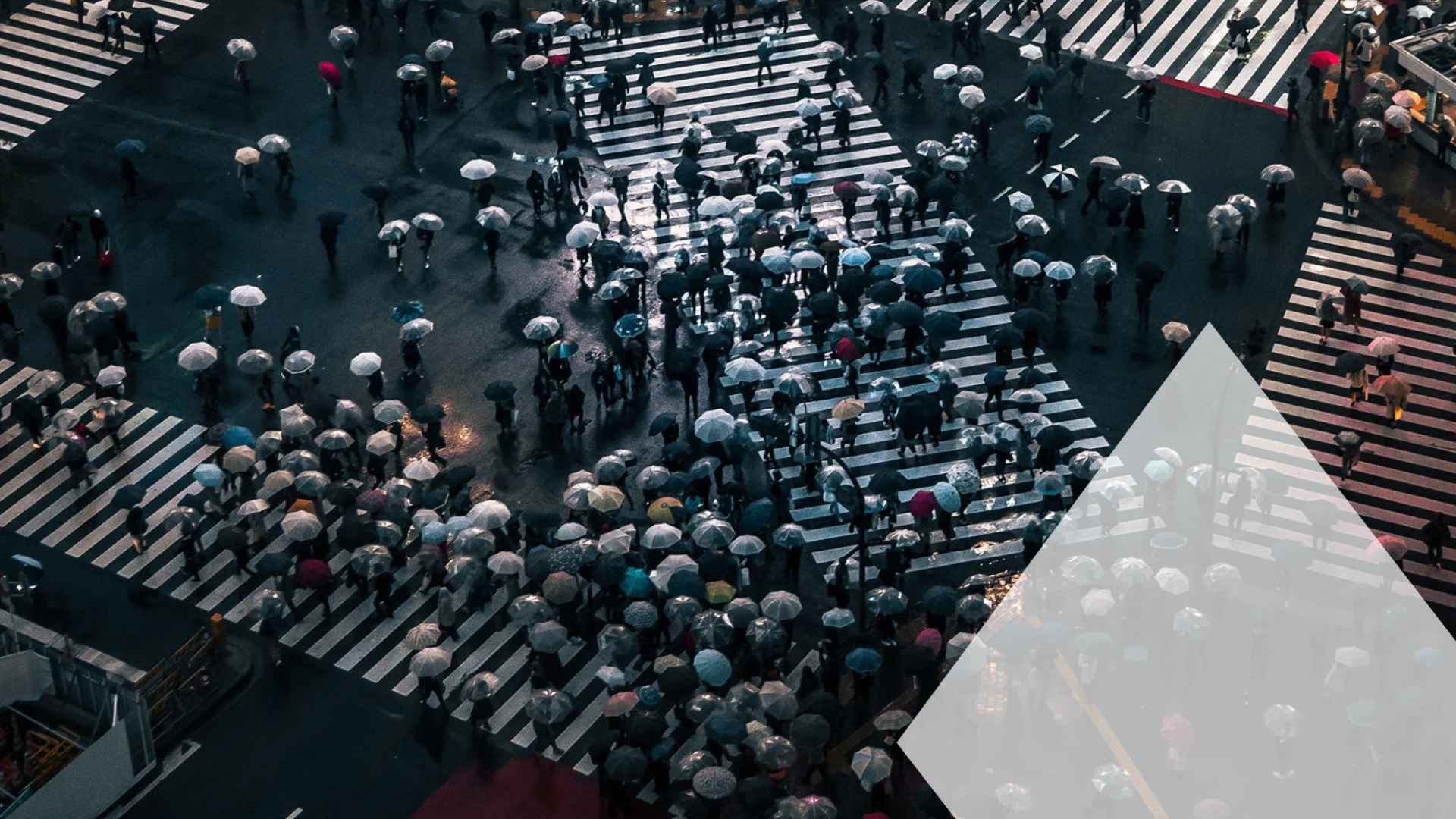With the world being on fire, how much can we really see in the future? Nobody has a crystal ball to see what the future brings. We are truly disrupted on a global scale. How can we make sense of what is happening around us? Who can show us the way? For many, the answer is ‘I don’t know’. However, what we can do is look at some megatrends that have a profound impact on us. It is not an exhaustive list. It is just a way to get started. What is important, is that you start to see the opportunities and threats underlying them.
Changing demographics
In ten year’s time the world population is expected to have grown by an additional 1 billion people. Much of this growth will come not from the Western world but from areas such as Asia and Africa. We are also growing older, and in many Western countries we produce less children. Larger groups of older customers bring huge opportunities. Not only do they have more money, they also have a lot more time to spend it. Labor markets are changing as well. In Western societies we are expected to participate longer as active contributors, and more women will become part of this market.
Globalization & shifting economic power
The world has gradually become one market. Even though some world leaders might throw their countries back towards protectionism (through walls and/or tariffs and misinformation), the long and underlying trend is unification and globalization. The underlying financials have woven a tight net, holding everything in its grip. Economic power is shifting towards the more upcoming economies. We expect no domination by one, but instead many power centers in the world. The current COVID-19 crisis sheds new light on globalization and its effects on trade relations. Are you affected?

Rise of the global middle class
In sync with this economic power shift we see a rise of the global middle class. They are getting richer, bigger in numbers and have more money to spend. They are also more adventurous and travel around the world. Therefore, they are spreading innovations to all parts of the globe.
Accelerating urbanization
The modern ‘glocalization.’ Centuries ago only a few of us lived in cities. Cities were not nice places to live. They were dirty, cramped, polluted and criminal. Nowadays up to 50% of the world population lives in cities, and this is expected to rise to more than 70% by 2050. This results in new housing concepts, a high demand for efficient infrastructure and new solutions for the abandoned outskirts.
Climate change and resource scarcity
Although COVID-19 has a positive impact on ecology, we are still messing up our planet. Our planet has a hard time facilitating our increased consumption and population growth. There is an imminent threat to our habitat. We need new ways of thinking and doing. The circular economy for example gives us full autonomy over consumption in closed nearby circles. The growing population together with technological innovation stimulates the need for and brings about scarcity of (natural) resources. Recycling, renewables, sharing of scarce and or underutilized assets are just a few answers. We need them all and deployed by everybody – USA and emerging economies included – and fast.
Privacy 2.0
The desire for privacy sends people on a quest for truth – shunning fake news and manipulation by the likes of Cambridge Analytica – creating a need for complex requirements that facilitate a higher degree of privacy. GDPR laws attempt to protect people while at the same time frustrate businesses and go against the grain of increased relevance and personalization. The apps we are looking for to undo the (partial) lockdown of our economies face heavy criticism in the face of privacy concerns.
Unbanked
Substantial numbers of people in Africa and India, and even 6.5% of the US population, do not have a bank account. Most of these people have no access to, or are shunned by, financial institutions. With the rise of new fintech players like Ant Financial (the former Alipay), and voucher and token startups, the whole incumbent financial world will become disrupted and obsolete. There will be no need for legacy banks and credit card companies. The digital wallet will take care of everything: transactions, salary payments, loans; the whole of (customer) banking.

Deep Fake
This is the state in which we will no longer be able to tell what is real and what is fake. At first, we will probably not be aware of this. But once we are, it will be the end of trust as we know it. What and who can we trust anymore? It might bring us back to the fear and terror of the Cold War, when in Eastern Europe anybody could have been a spy working for the feared intelligence services. At the same time, you can spot a new industry potentially emerging: the ‘fake busters.’
Technology
Technology trends deserve a special place in our observations about the future. Technology has a major impact on our world. It changes our behavior; it changes our lives. Rapid advances in robotic technology replace real human jobs. The technology of the Amazon stores without cashiers potentially replaces the jobs of 11 million cashiers in the US alone. Blockchain technology and smart contracts create huge amounts of efficiency. At JPMorgan Chase, software does in seconds what lawyers take 360,000 hours per year to achieve. The bottom line of this is that if a job can be reduced to a set of instructions (i.e. data collection, analysis or predictable physical work), the job won’t exist much longer. A machine will soon do it better, faster, cheaper and more reliable than any human being. At the same time, machines are getting better too. With the use of artificial intelligence, computers can give advice. Should I fear for my own job?
There are many opinions about the impact and influence of artificial intelligence (AI). The late Stephen Hawking said that “the development of full artificial intelligence could spell the end of the human race”. And even Elon Musk stated that AI could be “humanity’s biggest threat”. The conversation around AI is often confusing and misleading. We believe artificial intelligence is a key area of technology which is proliferating. Over the past few years, AI professionals have been released from their astronomically paying jobs at the likes of Google and Apple and have started their own companies. The technology behind AI has become more and more available. For example, Google released TensorFlow as open source to put AI technology into many more people’s hands and Google AI can now be learned as an online course. Also, improvements to AI have made it possible to function on smaller and smaller datasets. Dangerous? The current pessimists believe that AI systems can be ‘uncontrolled’ ruthless goal-oriented systems, lacking in human values. Systems that even humans can’t stop because of the self-learning capacity of the algorithm. It knows when you want to intervene and works its way around it. At RevelX we believe in the progress of AI. Like any other new technology or science, it needs time to develop and acquire an ethics of its own fed by our high standard of values.
According to Marc Andreessen of Andreessen Horowitz – the most successful venture capital firm in the world – every product will become a software product and, subsequently, every company will become a software or technology company. In the long run, the best software company will dominate the relevant industry. This hails to another point that the technology domain is not exclusive to ‘tech startups.’ As a matter of fact, only 15% of the world’s programmers work for a startup.
There are a lot of myths around the tech successes of today. People often forget the multitude of failures buried in the tech graveyard and why they failed. Ultimately it is us, the customers, that (still) make the difference. Are we willing to use and accept the new? In my next blog I will zoom in into the customer of tomorrow. Or is he already here today?
It is important to keep in mind that when we use new technology, we do so according to the preferences and ideas of those who created it. Of course, it is still our decision to use it at all. It is not inevitable. It is more like an evolution.
Please share with us your most disruptive trends. We would love to hear from you! Drop us a line at eric@revelx.nl.

Introducing DARE: The Mindset for Successful Innovators in The Digital Age
Learn how successful innovators and business leaders realize growth with DARE – now Amazon’s #1 best-selling title!
Eric de Groot
Boardroom strategist with unparalleled creative brainpower. Always focused on growth. Creates speed by combining business modeling with inventive pragmatic solutions. Invests in involvement over a sustained period.
Related posts
Strategies to counter disruption or to become a disrupter yourself
We see the same things happening in the business world.…
January 7, 2021
Early warning signals for disruption
Any industry can be disrupted. Netflix is a famous example.…
December 15, 2020
The Great Reset: Disrupt Or Be Disrupted
We live in times of unprecedented change. In order to cope…
December 3, 2020



